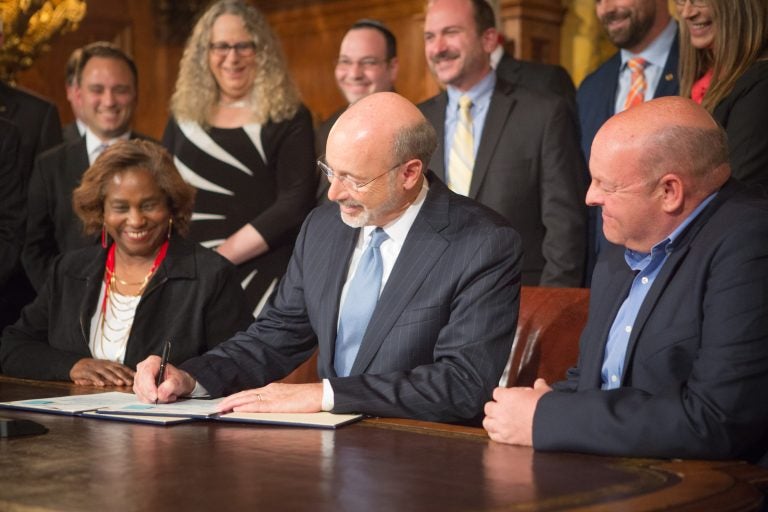After pressure from religious schools, Pa. removes nondiscrimination language from tax credit program
Listen 1:57
Gov. Tom Wolf signing an anti-discrimination executive order in April 2016. (Courtesy of Pa. Dept. of General Services)
Should private schools that benefit from Pennsylvania’s tax credit programs adhere to the rules of the public system?
That debate often revolves around school accountability because the state does not require private schools to administer and publish the results of standardized tests.
But the question has also cropped up in recent weeks around an entirely different issue — employee discrimination.
In May, Governor Tom Wolf’s administration removed nondiscrimination language from guidelines governing private schools that receive money through state tax credits.
The removal came soon after a coalition of private schools and lawmakers complained the language violated state law, prompting administration officials to acknowledge that the clause was inserted by accident.
The eliminated language would have barred private schools that benefit from the Educational Improvement Tax Credit (EITC) and the Opportunity Scholarship Tax Credit (OSTC) from discriminating against their employees on the basis of “gender, creed, color, sexual orientation, gender identity or expression.”
The inclusion of “sexual orientation, gender identity or expression” irked several religiously-affiliated private schools around the state. One school, Dayspring Christian Academy in Lancaster County, called the language a “direct violation of our Christian conscience,” and encouraged parents to contact their legislators.
This skirmish highlights, for some, a lack of state oversight for religious and private schools that benefit from state policy. With some lawmakers pushing to create new avenues for private schools to receive state funds, that tension will likely grow.
“We think that the programs are subsidizing discrimination,” said Reynelle Brown Staley, a policy attorney with the Education Law Center.
‘Administrative error’ triggers debate
Officials say the current debate was spurred by a misunderstanding.
It began in April 2016, when Governor Tom Wolf signed an executive order that barred state agencies and “contractors doing business with the Commonwealth” from discriminating against employees based on the factors noted above. In January 2018, this language was incorporated into guidelines for organizations that benefit from the EITC and OSTC programs, which are capped at $250 million in tax credits annually.
These programs are overseen by Pennsylvania’s Department of Community and Economic Development, which, according to administration officials, mistakenly thought the new executive order applied to organizations receiving school tax credit money.
“This is really just a case of a simple administrative error,” said J.J. Abbott, spokesman for the Wolf administration. “DCED has been working to update their programs to comply with the governor’s non-discrimination executive order, which applies to contracts and grants, not tax credits.”
Through EITC and OSTC, the state does not give money to private schools directly. Instead, a business that donates money to a scholarship-granting organization is given a credit that translates into a deduction in its state taxes. That scholarship-granting organization can then help cover tuition costs for students attending a private school.
Sometimes these scholarship-granting organizations and the private schools that benefit operate under the same umbrella, which is the case for Dayspring Christian Academy. According to its website, “as many as 145 families” receive a tuition discount through the tax credit programs.
Absent a change in the law that governs the EITC and OSTC programs, Abbott explained, administration officials cannot compel private schools to comply with Wolf’s executive order on sexual orientation, gender identity, or expression.
There is no statewide law in Pennsylvania that prohibits employment discrimination on these bases, although some advocates, including Wolf, have been pushing for such a bill.
But where administration officials saw error, some religious schools saw an attempt to underhandedly curtail religious freedom.
“Without so much as a mention in state legislature, this requirement was set in place,” wrote Dayspring Christian to their supporters. “In fact, as we called our local representatives and senators, they had not even heard that this requirement was slipped in to the EITC/OSTC programs.”
Officials with Dayspring initially responded to a request for comment, but did not return subsequent calls to set up an interview. Keystone Crossroads also tried to contact lawmakers involved in lobbying for the removal of the nondiscrimination language, but did not receive an interview.
Skeptics of the tax credit programs often mention the lack of accountability and oversight for private school beneficiaries as one of their main objections.
Brown Staley said this latest incident is “part of a larger concern that we have about moves to provide government funding and other forms of government support to private institutions.”
Pennsylvania has numerous tax credit programs that also remain exempt from nondiscrimination regulations. These credits support industries such as film, alcohol, and agriculture, as well as targeted economic revitalization efforts.
Brown Staley argues private school recipients should be held to a higher standard because supporters of the tax credits frame them as ways to provide options outside of the public education system.
“If they are going to present EITC, OSTC, private and parochial schools as an alternative to public schooling then it should be subject to similar oversight,” she said.
In 2015, Waldron Mercy Academy, a private Catholic school outside Philadelphia, made headlines when it fired its religious director, a gay woman. Waldron Mercy is among the Pennsylvania private schools registered as an EITC recipient.
WHYY is your source for fact-based, in-depth journalism and information. As a nonprofit organization, we rely on financial support from readers like you. Please give today.





